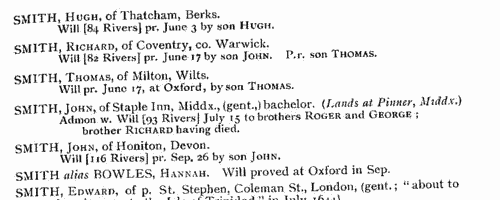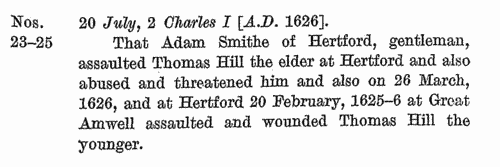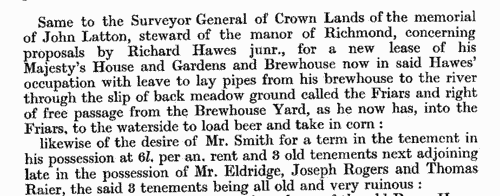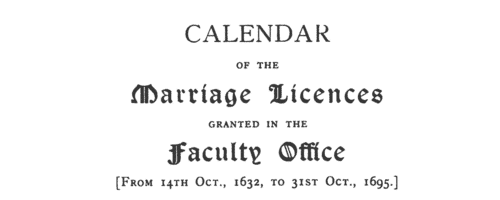Add this eBook to your basket to receive access to all 72 records. Our indexes include entries for the spelling course. In the period you have requested, we have the following 72 records (displaying 1 to 10): These sample scans are from the original record. You will get scans of the full pages or articles where the surname you searched for has been found. Your web browser may prevent the sample windows from opening; in this case please change your browser settings to allow pop-up windows from this site. PCC Probates and Administrations
(1647)
The Prerogative Court of Canterbury's main jurisdiction was central and southern England and Wales, as well as over sailors &c dying abroad: these brief abstracts, compiled under the title "Year Books of Probates", and printed in 1906, usually give address, date of probate and name of executor or administrator. They are based on the Probate Act Books, cross-checked with the original wills, from which additional details are, occasionally, added. The original spelling of surnames was retained, but christian and place names have been modernised where necessary. | Sample scan, click to enlarge

| Hertfordshire Sessions
(1619-1657)
Incidents from the Hertfordshire Sessions Books and Sessions Minute Books. These cover a wide range of criminal and civil business for the county. | Sample scan, click to enlarge

| Hertfordshire Sessions
(1581-1700)
Incidents from the Hertfordshire Sessions Rolls. These cover a wide range of criminal and civil business for the county, with presentments, petitions, and recognizances to appear as witnesses: many of the records concern the county authorities dealing with regulation of alehouses, religious conventicles, absence from church, highways, poaching, profanation of the Sabbath, exercising trades without due apprenticeship &c. Unlike the Sessions Books, the decisions of the justices are not recorded on the rolls, which serve more as a record of evidence and allegations. Where the date of a roll is given with an asterisk, it indicates that that particular document was not then in the county muniments, but in the archives of the Marquess of Salisbury (whose ancestors had served as Custos Rotulorum) at Hatfield House. This is a calendar of abstracts of extracts: it is by no means a completely comprehensive record of the surviving Hertfordshire sessions rolls of the period, but coverage is good. | Sample scan, click to enlarge

| Hertfordshire Sessions
(1658-1700)
Incidents from the Hertfordshire Sessions Books and Minute Books. These cover a wide range of criminal and civil business for the county: numerically, the the most cases (759) concerned not attending church; presentments about repairs to roads and bridges (247); unlicensed and disorderly alehouses (226); assault (156); badgers, higlers, &c., trading without licence (142); and trading without due apprenticeship (117). This calendar gives abstracts of all entries in the Sessions Books and Minute Books for Hertfordshire sessions for the period. | Sample scan, click to enlarge

| Treasury Books
(1700-1701)
Records of the Treasury administration in Britain, America and the colonies, from October 1700 to December 1701.
| Sample scan, click to enlarge

| Licences for marriages in southern England
(1632-1714)
The province or archbishopric of Canterbury covered all England and Wales except for the northern counties in the four dioceses of the archbishopric of York (York, Durham, Chester and Carlisle). Marriage licences were generally issued by the local dioceses, but above them was the jurisdiction of the archbishop. Where the prospective bride and groom were from different dioceses it would be expected that they obtain a licence from the archbishop; in practice, the archbishop residing at Lambeth, and the actual offices of the province being in London, which was itself split into myriad ecclesiastical jurisdictions, and spilled into adjoining dioceses, this facility was particularly resorted to by couples from London and the home counties, although there are quite a few entries referring to parties from further afield. Three calendars of licences issued by the Faculty Office of the archbishop were edited by George A Cokayne (Clarenceux King of Arms) and Edward Alexander Fry and printed as part of the Index Library by the British Record Society Ltd in 1905. The first calendar is from 14 October 1632 to 31 October 1695 (pp. 1 to 132); the second calendar (awkwardly called Calendar No. 1) runs from November 1695 to December 1706 (132-225); the third (Calendar No. 2) from January 1707 to December 1721, but was transcribed only to the death of queen Anne, 1 August 1714. The calendars give only the dates and the full names of both parties. Where the corresponding marriage allegations had been printed in abstract by colonel Joseph Lemuel Chester in volume xxiv of the Harleian Society (1886), an asterisk is put by the entry in this publication. The licences indicated an intention to marry, but not all licences resulted in a wedding. | Sample scan, click to enlarge

|  Masters and Apprentices
(1716) Masters and Apprentices
(1716)
Apprenticeship indentures and clerks' articles were subject to a 6d or 12d per pound stamp duty: the registers of the payments usually give the master's trade, address, and occupation, and the apprentice's father's name and address, as well as details of the date and length of the apprenticeship. 3 August to 31 December 1716. | Sample scan, click to enlarge

| Citizens of London: Blacksmiths
(1724)
A list of the persons who polled for Charles Goodfellow esquire at the late election for a member of parliament to represent the city of London, held 23rd to 28th November 1724. Full names are given, surname first, arranged by the livery companies to which the citizens belonged. This list was published in The Daily Post and elsewhere: 'Gentlemen, we desire you will carefully examine the following list of polsters, and in case you find yourselves or friends polled by others, or any polled who are dead or absent, or who have no right, that you'll give immediate notice thereof at Salter's Hall in Swithin's Lane, where attendance will be daily given from 8 a-clock in the morning till 9 a-clock at night. It is not doubted but the endeavours to obtain a law to secure your invaded rights and privileges will be soon successful, this should now excite you to a diligent search after false pollers, which will in all probability make the majority greater for sir Richard Hopkins. N.B. The scrutineers so far as they have proceeded, do find a much greater number of false pollers for Mr Goodfellow, than for sir Richard Hopkins.' | Sample scan, click to enlarge

|  Masters and Apprentices
(1724) Masters and Apprentices
(1724)
Apprenticeship indentures and clerks' articles were subject to a 6d or 12d per pound stamp duty: the registers of the payments usually give the master's trade, address, and occupation, and the apprentice's father's name and address, as well as details of the date and length of the apprenticeship. 4 May to 31 December 1724. | Sample scan, click to enlarge

|  Masters and Apprentices
(1726) Masters and Apprentices
(1726)
Apprenticeship indentures and clerks' articles were subject to a 6d or 12d per pound stamp duty: the registers of the payments usually give the master's trade, address, and occupation, and the apprentice's father's name and address, as well as details of the date and length of the apprenticeship. 3 January to 31 December 1726 | Sample scan, click to enlarge

|
Research your ancestry, family history, genealogy and one-name study by direct access to original records and archives indexed by surname.
|












